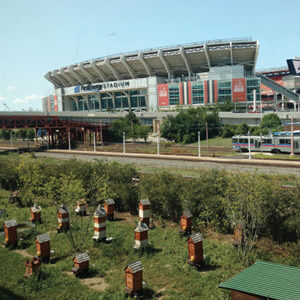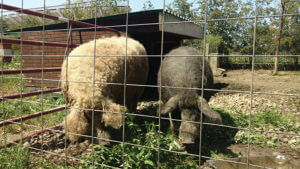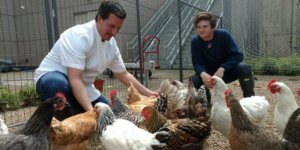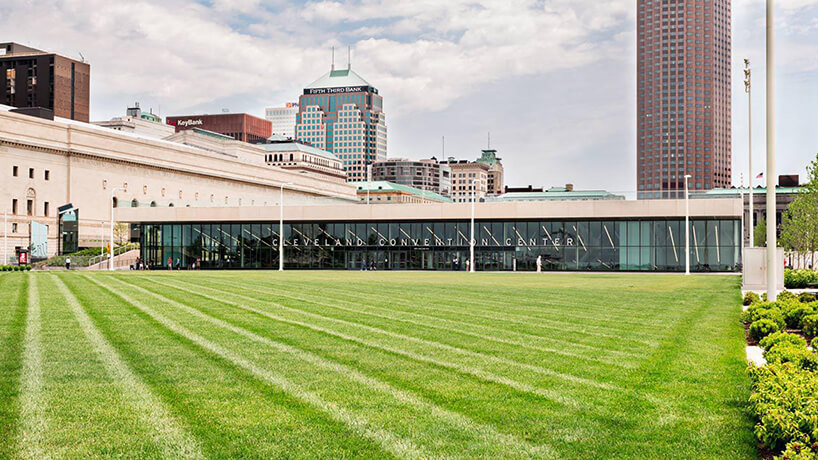The Huntington Convention Center of Cleveland has its own farm. Read all about it in this earlier Convene story.

The Huntington Convention Center of Cleveland.
If attendees at the Huntington Convention Center of Cleveland looked out the windows on a certain day last summer, they would have taken in not only the stunning view — a swath of downtown that includes Lake Erie, FirstEnergy Stadium, and the Rock & Roll Hall of Fame — but a startling sight just below: a young man chasing three 500-pound pigs in the yard.
The pigs weren’t part of an agricultural expo, or escapees from a local farmer’s market. The convention center is their home — as it is for more than two dozen chickens, beds of vegetables, and about a million bees.
When the center was being built five years ago, management company SMG and food-service provider Levy Restaurants decided to do things differently. The building would be as sustainable as possible, from its physical design to its recycling and locally sourced food service. And that was just the beginning.
“We have a 12.5-acre green roof [a park-like public mall], we have a land ll reduction of 50 percent — that’s from 265 tons of waste last year,” said Dave Johnson, director of communications for the center. “The whole property is over a million square feet, and when we were done, we had about a quarter of an acre left over — an old apron for an old loading dock — that wasn’t able to be used for anything.”
The space, they decided, was perfect for a small farm.
NATURAL SELECTION

Pigs on “The Real FarmVille.”
It’s called “The Real FarmVille.” Levy and Executive Chef Matt Del Regno had embraced the idea of high-quality, locally sourced products from the beginning. That meant truly free-range, field-living animals raised on humane farms, hormone- and antibiotic-free, for everything — right down to the deli meats. “It has not been an easy thing to find, though the trend is heading there,” Del Regno said. “We want attendees to look down through the big windows and ask, why are there animals outside the ballroom window? It’s the whole point of what we’re doing. It’s not what the farm is, it’s why it is.”
Del Regno worked hard to educate himself on the the birds and the bees. To start, he had a fantastic resource practically in his backyard: the Chef’s Garden, a Huron, Ohio–based sustainable farming operation that custom- grows produce for Levy as well as top restaurants from New York to Florida to Arizona. The Chef’s Garden also hosts the annual Roots conference, which highlights culinary issues and trends. It was there that Del Regno was first turned on to the benefits of keeping bees, not just for the purity of the product but for the contribution to the struggling honeybee population, so vital to the pollination of the food cycle.
“I was inspired by the importance of working with natural honey products,” Del Regno said, “and getting away from the commercial piece — reducing pesticides and herbicides, going back to a more natural and sustainable way of producing your own honey.” He began with two hives, which quickly grew to 16 on the property and 12 more around the Cleveland community. The operation produced 2,000 pounds of honey last year, used in the center’s own recipes, its tea and coffee service, and as giveaways to guests. Next came the gardens — tomatoes and corn, mesclun and peppers, made into a signature fermented hot-pepper sauce — and the chickens, now totaling 26. “In full swing,” Del Regno said, “we’re able to pull 25 percent of [total egg] use from our farm.”
BEE ALL, END ALL

Andy Mondello (right) became FarmVille’s first dedicated employee.
One day last April, Del Regno received an email message from Andy Mondello, who was looking for an internship. A sophomore business-management major at Ohio State University’s Agricultural Technical Institute, Mondello had dreams of running his own bee-keeping operation. He already had two hives at home, and helped run 70 hives at the school’s Bee Lab.
Mondello became FarmVille’s first dedicated employee last summer — 50 hours a week at $13 an hour — performing all the farm-related tasks that previously had been handled by Del Regno’s food-service staff. “When Matt told me about my duties I was pretty wowed, because I was only hoping to take care of the bees, and he said, ‘You’re basically in charge of the farm,’” Mondello said. “I learned so much from Matt and all the cooks who helped me every day when I needed a hand.” Including the day the pigs escaped their enclosure. “It was right under the big windows, and I had to act like this was normal, no big deal.”
Hiring Mondello also offered a way for the center to help entomologists better understand the environmental factors contributing to colony collapse — the unexplained failure of anywhere from 20 to 50 percent of hives in the United States. An ongoing study at OSU collects data on the pollen from a variety of settings, gathering samples from bees as they pass through traps to reach their hive. With Mondello working at FarmVille, the convention center’s bees could provide the study’s urban sample, allowing OSU to see how bees respond to heavy-metal environments.
“Taking on an intern was the first time we dedicated anyone to farm-specific tasks, and the first time we paid someone. Until then, it had been the cooks, servers, and dishwashers,” Del Regno said. “If you want to look carefully at where your food is coming from, it takes a lot more work. It’s not cheap and it’s not easy, but it’s something we’re committed to. And that investment was a great return on our money and time.”

